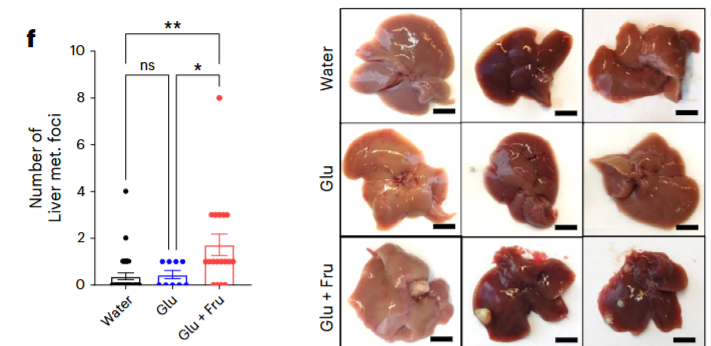
COMMENT:
The application to sugary drinks is obvious, however I would extend it to fruit and fruit juice consumption as well which both have high amounts of fructose and glucose, as well as sucrose. As examples:
| Fruit / Juice | Serving Size | Fructose (g) | Glucose (g) | Total Sugars (g) |
| Whole Fruits | ||||
| Apple | 1 medium | 10.7 | 4.4 | 18.9 |
| Banana | 1 medium | 5.8 | 5.9 | 14.4 |
| Grapes | 1 cup | 12.2 | 10.9 | 24.6 |
| Orange | 1 medium | 2.9 | 2.6 | 12.3 |
| Peach | 1 medium | 2.3 | 1.5 | 12.6 |
| Pear | 1 medium | 11.0 | 4.8 | 17.4 |
| Pineapple | 1 cup, chunks | 3.5 | 2.8 | 16.3 |
| Strawberry | 1 cup, whole | 3.5 | 2.9 | 7.1 |
| Watermelon | 1 cup, diced | 5.8 | 2.4 | 9.4 |
| Fruit Juices | ||||
| Apple Juice | 8 oz (237 mL) | 13.6 | 6.4 | 23.2 |
| Grape Juice | 8 oz (237 mL) | 17.3 | 15.9 | 35.0 |
| Orange Juice | 8 oz (237 mL) | 5.4 | 5.0 | 20.0 |
| Pineapple Juice | 8 oz (237 mL) | 5.7 | 4.8 | 23.4 |
SUMMARY:
Title of the Article: Fructose and glucose from sugary drinks enhance colorectal cancer metastasis via SORD
Clinical Bottom Line
This preclinical study provides a compelling biological mechanism linking the consumption of sugary drinks to enhanced colorectal cancer (CRC) metastasis. In cell lines and mouse models, a combination of glucose and fructose, mimicking sugar-sweetened beverages (SSBs), was shown to promote cancer cell migration and metastasis more than glucose alone. The mechanism is driven by the enzyme sorbitol dehydrogenase (SORD), which leads to metabolic changes that activate the mevalonate pathway. While these findings are not immediately practice-changing, they provide strong biological support for advising CRC patients to limit SSB intake and suggest that statins, which inhibit the mevalonate pathway, could be a potential therapeutic strategy to mitigate metastasis in this context, warranting further clinical investigation.
Results in Context
Main Results
The study’s primary finding comes from mouse models where CRC cells were implanted into the caecum. Mice given drinking water containing a glucose and fructose mixture (Glu + Fru) developed significantly more liver metastases compared to mice given water or glucose alone. This pro-metastatic effect was shown to be dependent on the enzyme SORD; when cancer cells with SORD genetically knocked out were used, the Glu + Fru mixture failed to increase liver metastasis.
Definitions & Context
The enzyme SORD was evaluated for its prognostic and mechanistic role. A prognostic marker provides information about the likely course of a disease, such as progression or metastasis. In this study, the presence and activation of SORD in the context of high sugar exposure were linked to a worse outcome in preclinical models. The authors also found that SORD expression was significantly higher in human colorectal tumor tissue compared to adjacent normal tissue, and was particularly elevated in stem-cell-like tumor cells, which are associated with cancer aggressiveness. This supports SORD’s potential role as a marker of poor prognosis.
Assertive Critical Appraisal
Limitations & Bias (REMARK Framework)
-
Study Design: This is a preclinical study. Its findings are derived from experiments on established cancer cell lines and immunodeficient mice. This is a significant limitation, as the results may not fully translate to human patients who have intact immune systems and a more complex tumor microenvironment. The study provides a strong biological rationale but requires validation in human clinical trials.
-
Assay Methods: The study is methodologically rigorous. The authors use multiple, complementary mouse models of metastasis alongside in vitro assays to build a strong chain of evidence for their mechanistic claims. The use of genetic knockout models and rescue experiments provides robust support for the central role of SORD.
Applicability
The findings are not directly applicable to clinical practice today but strongly reinforce existing dietary guidance to limit the intake of sugar-sweetened beverages for patients with colorectal cancer. The observation that simvastatin, a commonly used statin, reduced liver metastasis in the mouse model is a significant, hypothesis-generating finding. It suggests a potential and readily available therapeutic approach that could be tested in prospective clinical trials, perhaps targeted to patients with high SSB intake and SORD-expressing tumors.
Research Objective
The study aimed to determine whether the combination of glucose and fructose, typical of SSBs, promotes the progression and metastasis of advanced colorectal cancer and to uncover the underlying molecular mechanisms responsible for this effect.
Study Design
This was a preclinical, mechanistic study employing both in vitro (cell-based) and in vivo (animal-based) experiments. The in vitro portion used 13 different human CRC cell lines to assess growth, migration, and invasion in response to different sugar conditions. The in vivo portion used three complementary xenograft mouse models (caecum injection, intrasplenic injection, and colonic injection) to evaluate the impact of sugars on local invasion and distant metastasis to the liver.
Setting and Participants
The experiments were conducted in a laboratory setting. The “participants” were established human CRC cell lines and male immunodeficient laboratory mice (athymic NU/J and NOD scid gamma strains). The study also analyzed existing data from human tumor databases and used human tissue samples for protein expression analysis, but did not enroll human patients in an interventional study.
Bibliographic Data
-
Title: Fructose and glucose from sugary drinks enhance colorectal cancer metastasis via SORD
-
Authors: Tianshi Feng, Qin Luo, Yanlin Liu, Zeyu Jin, David Skwarchuk, Rumi Lee, Miso Nam, John M. Asara, Daya R. Adye, Philip L. Lorenzi, Lin Tan, Guangsheng Pei, Zhongming Zhao, Neda Zarrin-Khameh, Adriana Paulucci-Holthauzen, Brian W. Simons, Ju-Seog Lee, Scott Kopetz & Jihye Yun
-
Journal: Nature Metabolism
-
Year: 2025
This AI-generated analysis is for informational and research purposes only and is not a substitute for professional medical advice, diagnosis, or treatment. Always seek the advice of a qualified health provider with any questions you may have regarding a medical condition.
Original Article:
Full text pdf is: Fructose and glucose from sugary drinks enhance colorectal cancer metastasis via SORD
Rights and permissions
Open Access This article is licensed under a Creative Commons Attribution 4.0 International License. No changes were made.
To view a copy of this license, visit http://creativecommons.org/licenses/by/4.0/.
